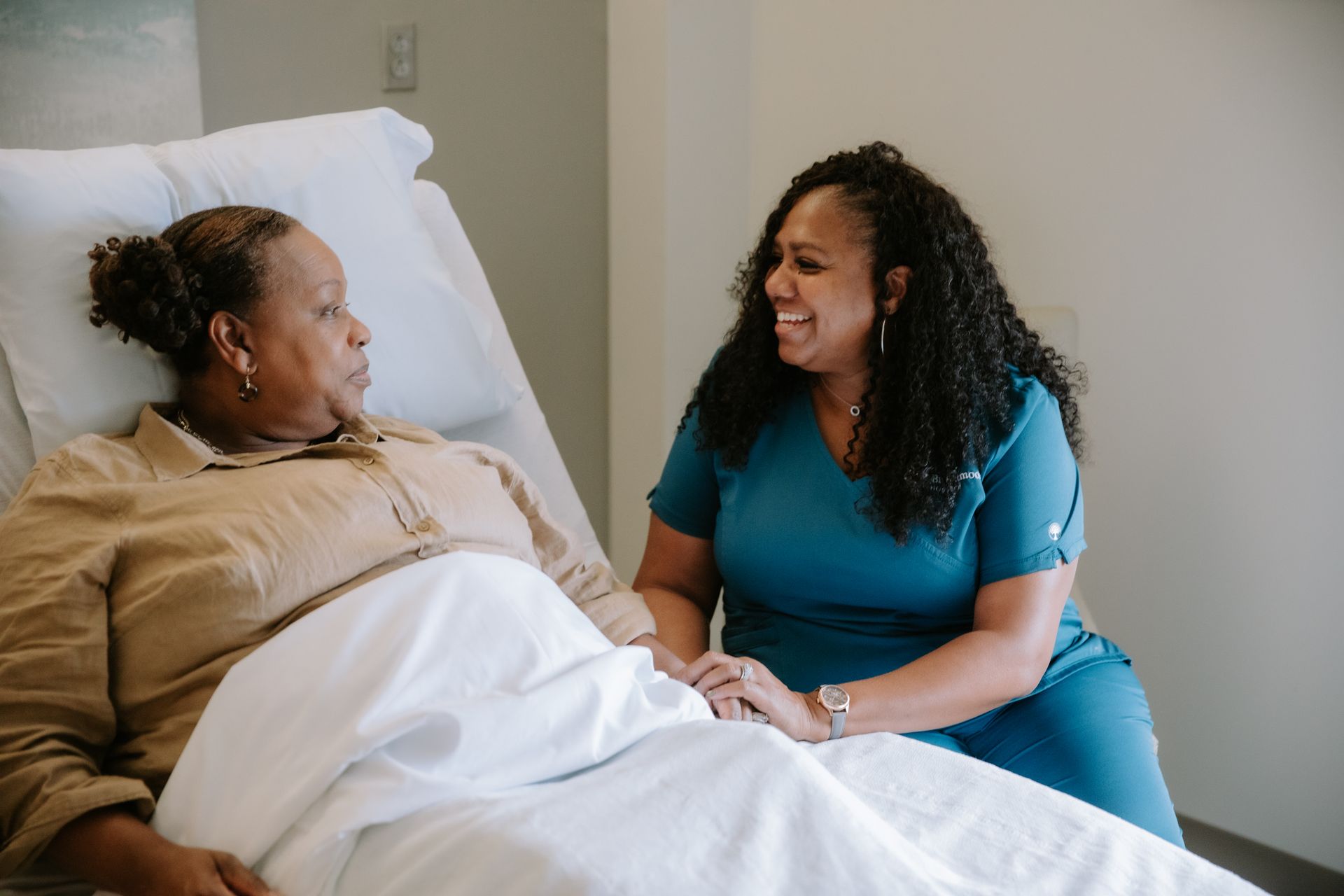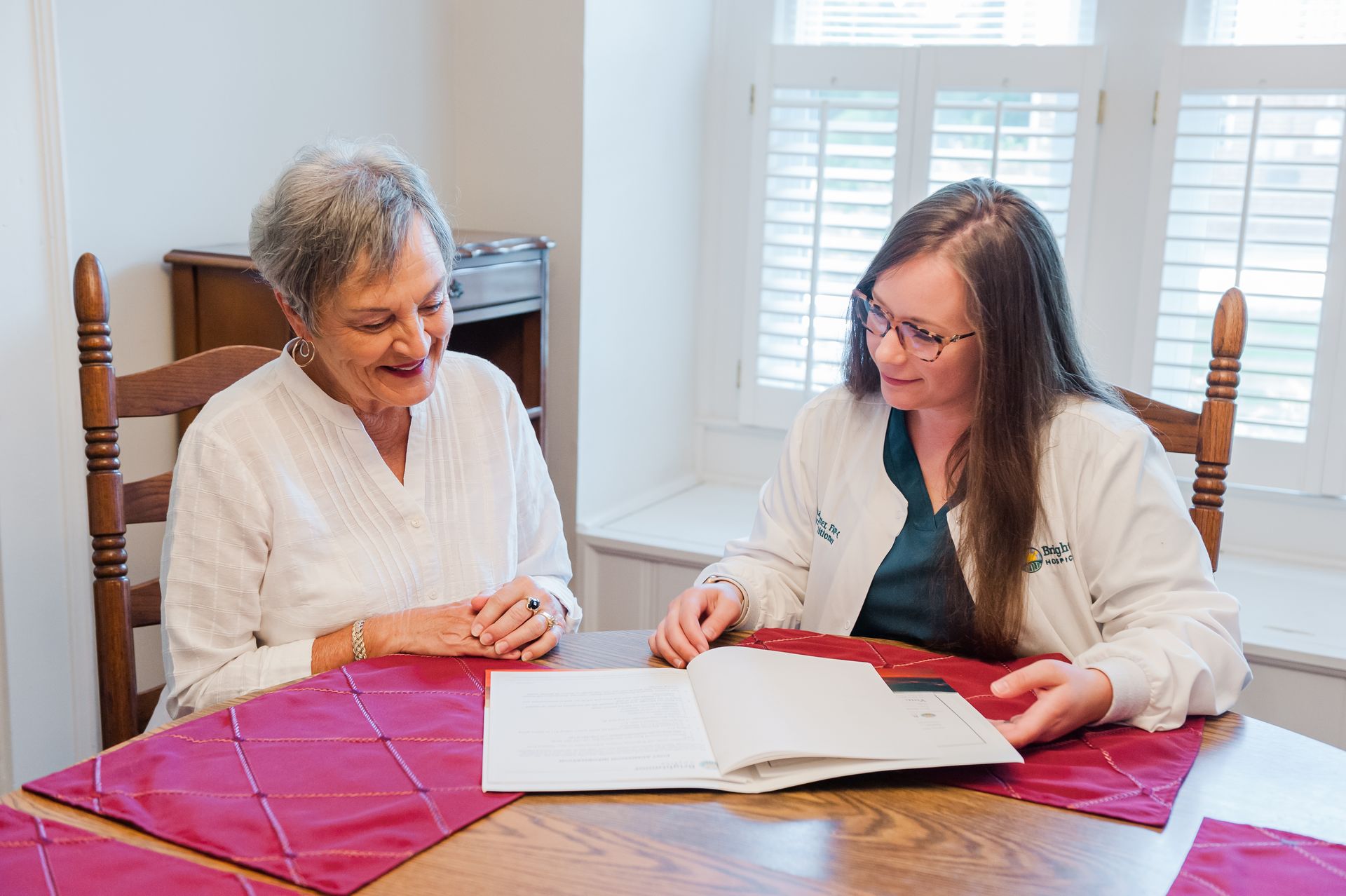Tips for Caregiver Self-Care and Avoiding Burnout
7012955601 • June 30, 2025
This is a subtitle for your new post
Caring for a loved one at the end of life is one of the most meaningful—and often one of the most emotionally and physically demanding—roles a person can take on. Whether you're a spouse, sibling, child, or close friend, your love and commitment matter deeply. But in the midst of caring for others, it’s easy to forget someone just as important: yourself.
At Brightmoor Hospice, we see firsthand the toll caregiving can take, and we’re here not only to support patients, but also to walk alongside their caregivers. Below are practical self-care tips and signs of burnout to watch for as you care for your loved one.
1. Recognize the Signs of Burnout
Caregiver burnout can sneak up slowly. Watch for these common signs:
- Chronic fatigue or trouble sleeping
- Increased feelings of anxiety, irritability, or hopelessness
- Loss of interest in activities you used to enjoy
- Physical symptoms like headaches or stomach issues
- Feeling emotionally detached from your loved one
- If you’re experiencing any of these symptoms, it’s time to pause and make self-care a priority.
2. Ask for—and Accept—Help
You don’t have to do this alone. Whether it’s asking a family member to run errands, letting a neighbor cook a meal, or accepting support from your hospice team, help is available. Create a list of small tasks that others can do so you’re prepared when someone offers assistance.
3. Take Breaks Without Guilt
Rest is not selfish—it’s essential. Even a 20-minute walk outside, a quiet cup of coffee, or a short nap can reset your mind and body. If you’re working with hospice care, ask about respite services designed to give caregivers a much-needed break.
4. Stay Connected
Caregiving can feel isolating. Stay in touch with friends or join a support group (many are virtual now). Talking with others who understand your experience can relieve emotional strain and remind you that you’re not alone.
5. Focus on Small Moments of Joy
Amid difficult days, joy can still be found—in a shared smile, a meaningful conversation, or a moment of silence watching the sunrise. Give yourself permission to feel both sorrow and beauty during this time.
6. Make Time for Your Own Health
Keep your own medical appointments, eat regular meals, stay hydrated, and try to get sleep when you can. Your wellness matters—and staying healthy enables you to be present for your loved one.
Caregiving is an act of deep compassion, but even the most devoted caregiver cannot pour from an empty cup. By prioritizing your well-being, you’re not only taking care of yourself—you’re ensuring the best care for your loved one, too. If you're feeling overwhelmed, reach out. Our team at Brightmoor Hospice is here to support both patients and families through every step of the journey.
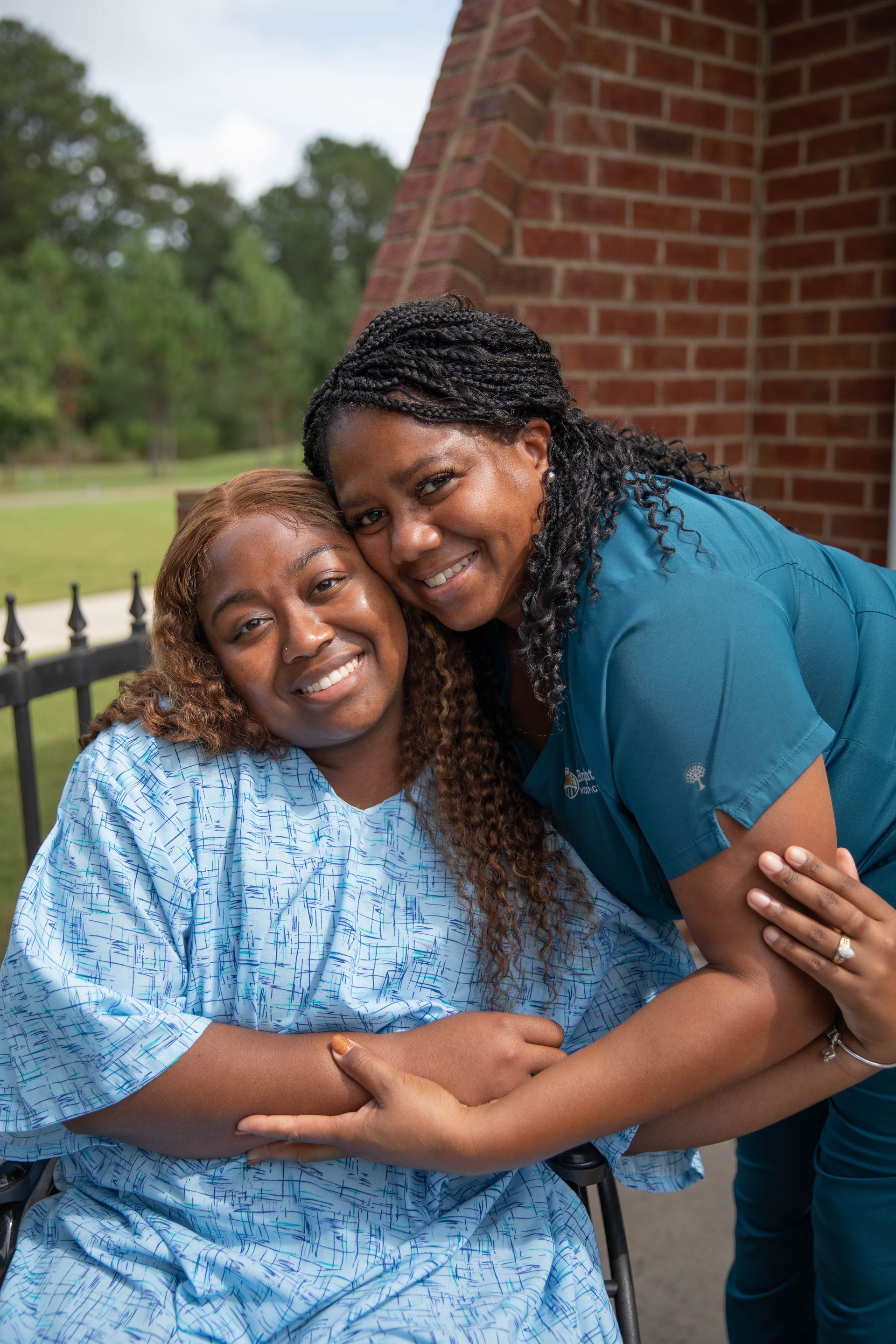
As a new year begins, many people reflect on what truly matters. While January is often associated with resolutions and fresh starts, it can also be a meaningful time to focus on presence, connection, and comfort—especially for patients and families facing serious illness. At Brightmoor Hospice, we believe that every season of life deserves to be honored with dignity, compassion, and purpose. The New Year offers a gentle opportunity to set meaningful goals that support emotional well-being, strengthen relationships, and celebrate life exactly as it is. Redefining “Goals” in Hospice Car e In hospice care, goals aren’t about checklists or milestones. Instead, they center on quality of life—what brings comfort, peace, and joy to each individual. Meaningful goals may look like: Spending uninterrupted time with loved ones Sharing stories, memories, or family traditions Finding comfort through music, faith, or favorite routines Managing symptoms to feel as comfortable as possible Creating moments of laughter, reflection, or connection These goals are deeply personal, and they can change over time. Our care teams are here to listen, support, and adapt every step of the way. Honoring What Matters Most to Patients Every patient has a story worth honoring. In the New Year, we encourage patients—when able—to reflect on what brings them peace or fulfillment. This might include reconnecting with family, enjoying a favorite pastime, or simply having quiet, meaningful moments. Brightmoor Hospice care teams work closely with patients to ensure their wishes are respected and their voices are heard. From physical comfort to emotional and spiritual support, our focus remains on what matters most to them. Supporting Families with Compassion and Care For families, the New Year can bring mixed emotions—hope, reflection, and sometimes uncertainty. Setting meaningful goals can help families feel more grounded and present during this time. Family goals might include: Learning how to best support a loved one Creating space for open conversations Practicing self-care and asking for help Finding comfort in shared moments, big or small Our hospice team supports not only patients, but entire families. We walk alongside you with education, guidance, and compassion—helping you navigate each day with confidence and care. A New Year Focused on Presence and Purpose At Brightmoor Hospice, honoring life means embracing each moment with compassion, understanding, and respect. As the New Year unfolds, we invite patients and families to focus less on resolutions and more on connection, comfort, and meaningful experiences. No matter the season, our mission remains the same: to provide exceptional care, comfort, and support—because every life, and every moment, matters. If you or a loved one would like to learn more about how Brightmoor Hospice can support you in the New Year, our team is always here to help.

The holiday season can be a bittersweet time for those who are grieving. While lights twinkle and music fills the air, your heart may ache for the person who isn’t here to share in it. At Brightmoor Hospice, we understand that grief doesn’t pause for the holidays — and that’s okay. Below are some thoughtful reminders and practical tips to help you care for yourself through this season of mixed emotions. 1. Practice Self-Care Grief can be physically and emotionally exhausting. It’s important to listen to your body and mind. Give yourself permission to rest, say no, or change plans if you need to. Balance alone time with connection — isolation can deepen your sadness, but you also don’t have to force yourself into gatherings you’re not ready for. Try to eat nourishing foods, get some movement, and rest as much as you can. Set realistic expectations — not everything has to be perfect this year. Focus on what feels meaningful to you, rather than what others expect. Keep a list of coping tools handy — things like deep breathing, journaling, listening to music, or taking a walk. And if you find yourself struggling, reach out for help — from a friend, counselor, or one of our bereavement team members. 2. Remember That Grief Is a Journey Grief is unique to each person and relationship. There is no “right” way to grieve and no timeline to follow. Some days may feel calm, others overwhelming — like waves rising and falling. Remember: you grieve because you loved deeply. Talking about your feelings with someone you trust can help lighten the load. We never “get over” grief; instead, we learn to carry it and find ways to keep love alive in new forms. 3. Expect and Allow Emotions The first holidays after loss can be especially difficult. You might feel joy one moment and guilt the next — that’s normal. Music, scents, or family traditions can stir up strong emotions. Allow yourself to feel whatever comes — tears, laughter, or even moments of peace. All feelings can coexist. It’s okay to miss your loved one and still enjoy the season. If the holidays fill you with dread, plan something to look forward to — maybe a trip, a special meal, or time with someone who understands. 4. Honor Traditions and Memories Your bond with your loved one doesn’t end — it simply changes. Find ways to keep their memory present during the holidays. You might light a candle, share stories, display photos, or do something meaningful in their honor. Continue the traditions that bring comfort and modify those that don’t. Speak their name — it’s a powerful way to keep their memory alive. 5. Stay Connected Surround yourself with people who care for you. Let them know how you’re feeling and what you can (and can’t) handle this season. Attend gatherings only if and when you’re ready — and have an exit plan if needed. Helping others can also bring comfort, whether through volunteering or acts of kindness in your loved one’s memory. And remember — it’s perfectly fine to skip sending holiday cards or hosting events this year. Those who love you will understand. If you’re walking through grief this season, you don’t have to do it alone. Brightmoor Hospice offers a compassionate Grief Support Group to help you find understanding and hope as you heal. To connect with our Grief Group, contact: Debbie Neely, Bereavement Coordinator 📞 770-467-9930
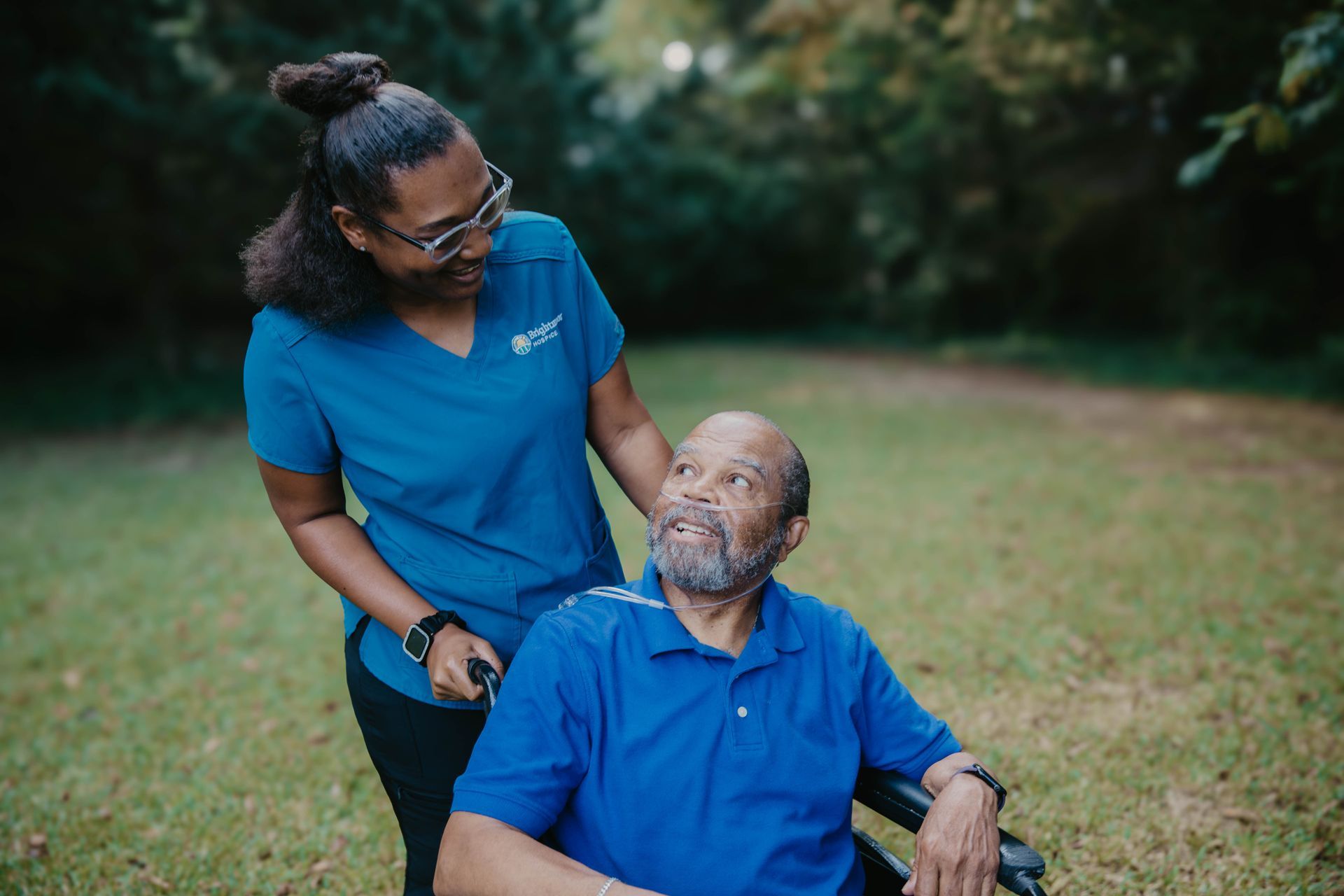
When people hear the word hospice, they often think it means giving up hope. But at Brightmoor Hospice, we see it differently. Hospice care isn’t about giving up—it’s about embracing life, cherishing each day, and creating moments that matter. Every person’s journey is unique, and hospice care is designed to honor that individuality. Our goal is to help patients and families find comfort, peace, and joy—no matter how much time remains. Finding Joy in Everyday Moments: Hospice care focuses on living fully in the present. For some patients, that might mean enjoying a favorite meal or listening to their favorite music. For others, it could be watching a sunset with family, celebrating a milestone birthday, or holding the hand of someone they love. At Brightmoor Hospice, our team helps make those moments possible. Whether it’s coordinating special visits, arranging a small celebration, or simply ensuring a patient is comfortable enough to enjoy time with loved ones, we believe every day can hold something meaningful. Supporting Families Through Connection Hospice isn’t just care for patients—it’s support for families, too. Our nurses, social workers, chaplains, and volunteers work together to create a circle of comfort and understanding. We’ve seen families reconnect, share laughter, and tell stories they hadn’t told in years. Sometimes, these simple moments of togetherness become some of the most treasured memories. Honoring Each Person’s Story Every life is a story worth celebrating. Through personalized care plans, spiritual support, and emotional guidance, we help patients reflect on their lives, their legacies, and the people they’ve touched along the way. Whether it’s helping a veteran receive a pinning ceremony, organizing a bedside wedding, or simply sitting together in quiet reflection, we see every day as an opportunity to honor a life well lived. The Brightmoor Promise At Brightmoor Hospice, we believe that even in life’s final chapter, there can be beauty, connection, and love. Our mission is to help patients live with dignity and comfort while helping families find peace and meaning in the moments they share. Hospice care is not about the end—it’s about celebrating the life that continues in the stories, laughter, and love that remain. If you’d like to learn more about how Brightmoor Hospice helps families celebrate life, we invite you to reach out. We’re here to walk beside you with compassion and care—every step of the way.

Choosing hospice care is one of the most important decisions a family can make. It’s natural to wonder: Who will be by our side during this journey? At Brightmoor Hospice, we want you to know that hospice care is never a “one-person job.” It’s a team effort—made up of compassionate professionals and volunteers—working together to care for both patients and their families. Here’s a look at the members of a typical hospice team and how each one supports you: Hospice Physician & Nurse Practitioner: The hospice physician and nurse practitioner oversee medical care, ensuring that symptoms such as pain, shortness of breath, or anxiety are well managed. They collaborate with your family’s primary doctor and help create a personalized care plan focused on comfort and dignity. Hospice Nurse: The nurse is often the familiar face families see most. Nurses monitor the patient’s condition, provide hands-on care, teach families how to give medications, and are available to answer questions. They bring both clinical skill and a compassionate heart to every visit. Certified Nursing Assistant (CNA): CNAs provide personal care such as bathing, grooming, and helping with mobility. Their gentle support often brings comfort and dignity in very practical ways, while also giving family caregivers a much-needed break. Social Worker: Hospice social workers support both the patient and family emotionally and practically. They can help with counseling, family communication, advance care planning, and connecting you with community resources. Chaplain/Spiritual Support: Spiritual care is available to all families, regardless of faith tradition. Chaplains provide a listening ear, prayers, and emotional support—always respecting personal beliefs and preferences. Volunteers: Specially trained volunteers give their time in countless meaningful ways. They may sit with a patient to offer companionship, help with errands, or provide respite so caregivers can rest. Volunteers remind families that they are not alone. Bereavement Support: Support doesn’t end when hospice services do. Brightmoor Hospice offers grief support to families for up to 13 months after the loss of a loved one, helping them navigate the healing process with care and compassion. The Brightmoor Difference At Brightmoor Hospice, we believe in caring for the whole person—body, mind, and spirit—while also supporting the family every step of the way. Our team works together like an extended family, ensuring that you and your loved one never walk this journey alone. If you have questions about hospice care or would like to learn more about how our team can help, please reach out to us. We are here to listen, guide, and walk beside you.
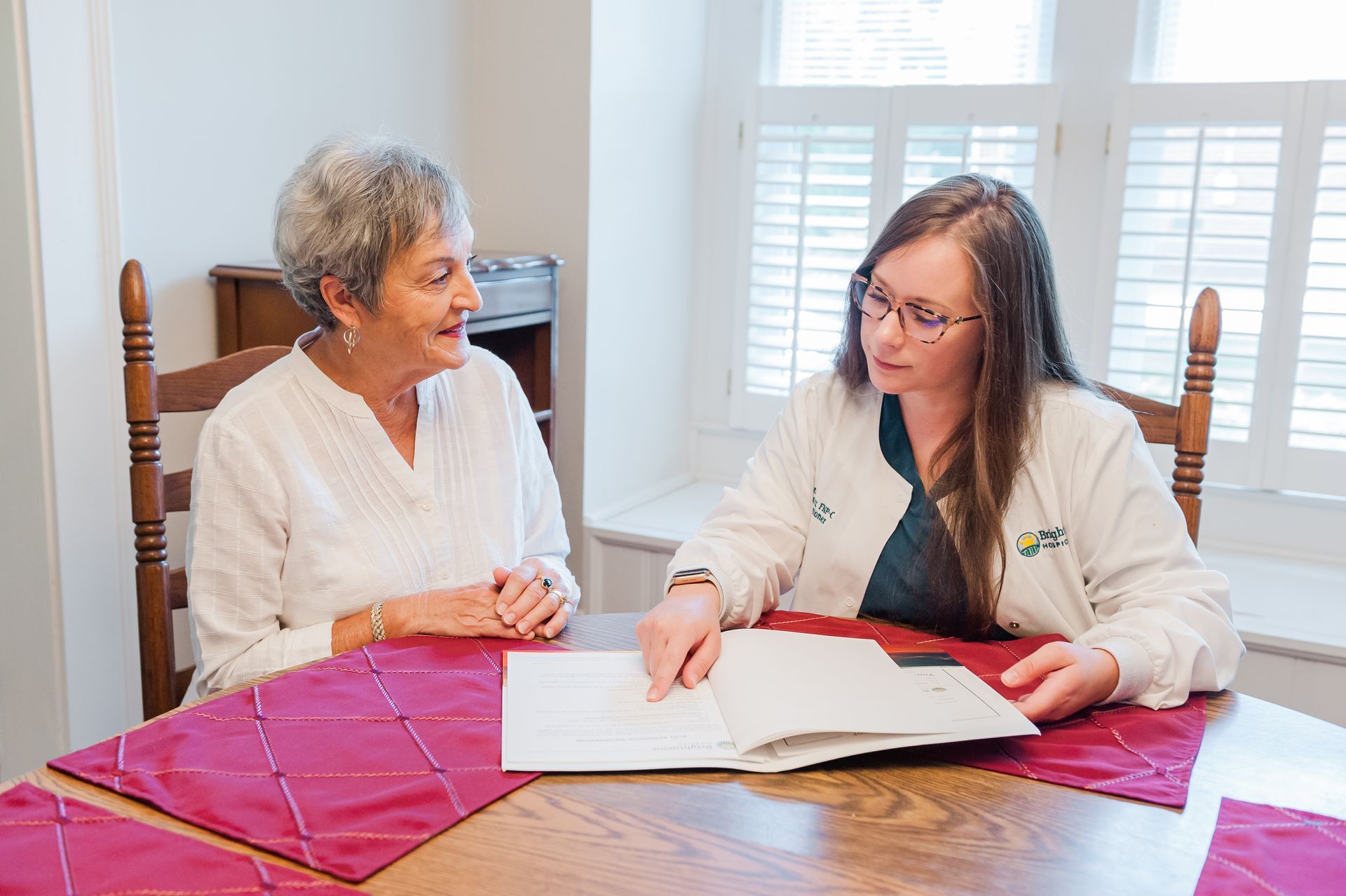
At Brightmoor Hospice, we believe in honoring every person’s wishes for their care—especially when they can’t speak for themselves. One of the most powerful ways to ensure your voice is heard during a medical crisis is by completing an advance directive. What Is an Advance Directive? An advance directive is a legal document that outlines your preferences for medical treatment if you're unable to communicate them due to illness or injury. It may include: Living Will – outlines what kind of medical treatments or life-sustaining measures you want or do not want (like ventilators or feeding tubes). Healthcare Power of Attorney – names a trusted person to make healthcare decisions on your behalf if you cannot. Why It Matters None of us can predict the future, but we can take steps to prepare. Completing an advance directive gives you the ability to: Have your wishes respected – You decide the type of care you want, based on your values and beliefs. Reduce stress for your loved ones – Families often struggle to make hard medical decisions without knowing what their loved one wanted. An advance directive provides guidance and peace of mind. Support your care team – It helps doctors and hospice professionals provide care that aligns with your goals. When Should You Complete One? The best time to complete an advance directive is before a crisis happens—ideally while you are still healthy. It’s especially important for individuals with serious or chronic illnesses, but truly, it’s something everyone over 18 should consider. Starting the Conversation Talking about end-of-life care can feel uncomfortable—but it’s one of the most loving and responsible things you can do for yourself and your family. Here are a few tips to get started: Choose a quiet, private time to talk with your loved ones. Share your values and what matters most to you. Ask your doctor or hospice team for guidance on your options. Brightmoor Is Here to Help Our Brightmoor Hospice team is committed to compassionate, patient-centered care. We’re here to help you understand advance directives, walk through the forms, and support you in making the choices that are right for you. If you or a loved one need help starting this process, don’t hesitate to contact us. It’s never too early—or too late—to make your wishes known. For more information and additional resources please visit: https://www.fivewishes.org

Jimmy Carter has been admired for his profound life of service and dedication to humankind. From his time as the 39th President of the United States to his numerous years of humanitarian work. Carter has illustrated humility, compassion, and leadership. In February 2023, at the remarkable age of 98, Carter made a very personal and courageous decision to enter hospice care. He passed away on December 29, 2024, at the age of 100, after nearly two years in hospice care.. This decision, like many in his life, sparked admiration and reflection, offering a reminder of his enduring grace and strength. A Life of Service Born in Plains, Georgia, in 1924, Carter served as a naval officer, peanut farmer, and eventually a politician. His presidency, which lasted from 1977-1981, prioritized human rights and peace, and his post-presidential years further solidified his humanitarian legacy. Through the Carter Center, he worked endlessly to combat disease, advance democracy, and foster worldwide peace. His hands-on involvement with Habitat for Humanity symbolized his dedication to serving others, earning him the Nobel Peace Prize in 2002. What is Hospice Care? Hospice care is a specialized form of care for individuals with terminal illnesses who have chosen to focus on comfort rather than curative treatments. It prioritizes quality of life over curative treatments, offering physical, emotional, and spiritual support to patients and loved ones. Carter’s transition to hospice followed years of heath challenges, including a cancer diagnosis, reflecting his pragmatic approach to life and death. A Courageous Decision Carter’s choice to enter hospice care resonated deeply with many. By opting for peace and time with loved ones, he highlighted the importance of prioritizing what truly matters. His decision aligns with his lifelong values of humility and simplicity, inspiring conversations about the significance of end-of-life care. The World’s Response Tributes poured in from around the globe following Carter’s hospice announcement. Admirers praised his bravery and reflected on his profound impact. His choice also sparked broader discussions about aging and the importance of planning for the end of life, helping to destigmatize conversations about death. A Lasting Legacy As Carter’s life nears its conclusion, his legacy continues to grow. His work as a statesman and humanitarian inspires countless people around the world. Even in hospice, Carter’s choices reflect his unwavering values, teaching us to live meaningfully and face life’s final moments with dignity. Conclusion Jimmy Carter’s hospice journey is a testament to his extraordinary life. It reminds us of the importance of service, humility, and acceptance. As the world reflects on his legacy, his example will continue to inspire generations to come.

Choosing the right hospice company for a loved one is a deeply personal and significant decision. Here are some key considerations to help guide you through this process, along with specific questions you might ask based on Piedmont’s recommendations. Understanding Hospice Care Hospice care focuses on providing comfort and support to individuals with terminal illnesses. It emphasizes quality of life, pain management, and emotional support for both the patient and their family. Steps to Choose the Right Hospice Service 1. Assess Your Loved One’s Needs Medical Needs: Determine the level of medical care required. Some patients may need specialized care for conditions like cancer or dementia. Emotional and Spiritual Needs: Consider the emotional and spiritual support your loved one might need. Many hospice services offer counseling and spiritual care. 2. Research Hospice Providers Reputation and Reviews: Look for reviews and testimonials from other families. Visit medicare.gov to compare providers. Personal recommendations can also be invaluable. 3. Evaluate Services Offered Comprehensive Care: Check if the hospice provides a full range of services, including medical care, pain management, emotional support, and respite care for family members. Availability: Ensure that the hospice can provide care 24/7, as needs can arise at any time. 4. Meet with Hospice Staff Initial Consultation: Arrange a meeting with the hospice team to discuss your loved one’s needs and ask questions about their services. Comfort Level: Assess your comfort level with the staff. It’s important to feel confident in their ability to provide compassionate care. 5. Understand Costs and Insurance Coverage Insurance: Check what services are covered by your loved one’s insurance, including Medicare or Medicaid. Out-of-Pocket Costs: Understand any additional costs that may not be covered by insurance. Questions to Ask Potential Hospice Providers Nursing Home with Hospice: 1. What medications will my loved one take under your services? Are they allowed to take [specific medication]? 2. How often does the hospice nurse come to check on my loved one? 3. Will there be out-of-pocket expenses? 4. How often does the CNA come? Home Hospice: 1. What happens at the first home visit post-hospitalization? 2. What type of staff comes to the home and how often? Are they there for weekend services? 3. How often can the nurse come check on my loved one? 4. What happens if there is a change in medical condition and my loved one declines further? 5. If I call at 2 am for help – will I get help right away or will I get an answering service? 6. What if I cannot take care of my loved one at home anymore? 7. What equipment do you provide? 8. What medications will my loved one take under your hospice services? Are they allowed to take [specific medication]? 9. What is the response time based on where I live if I have an emergency? 10. How quickly can you come back to my home if I need you? 11. What are your bereavement/grief services and when do they start? 12. What is respite care? How often can I get respite? Where can I get respite services? 13. How can your social worker assist me? 14. What support is there to help with finances, documents, etc.? 15. Do you have an inpatient should my loved one need respite or a higher level of care? Inpatient Hospice Centers: 1. What are the visiting hours? 2. What makes your inpatient hospice facility better than others? 3. What medications will my loved one take under your services? Are they allowed to take [specific medication]? 4. Can people go outdoors? 5. What amenities are in the room? Is the inpatient hospice facility for families? 6. Where do you transition my loved one if they are doing better? 7. Can I bring pets? Children? Are there age restrictions? 8. Does my loved one need anything? Conclusion Choosing the right home hospice service involves careful consideration of your loved one’s needs, thorough research, and open communication with potential providers. By taking these steps and asking the right questions, you can ensure that your loved one receives compassionate and comprehensive care during this important time.

